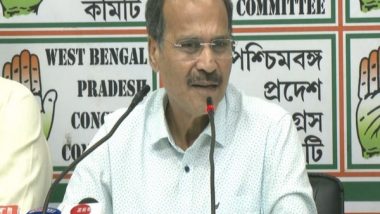New Delhi [India], December 24 (ANI): Congress leader Adhir Ranjan Chowdhury has written a letter to Prime Minister Narendra Modi, expressing concerns over the harassment of Bengali-speaking students in schools across Delhi and other states.
Chowdhury criticised the ongoing drives targeting illegal migrants, alleging that these initiatives are unfairly impacting legitimate Bengali-speaking residents.
Also Read | UK Royal Mail Scandal: Managers Faked Deliveries To Receive Bonuses, Says Report.
In his letter, Chowdhury highlighted the historical migration of Bengali-speaking people, particularly during the British era when the Bengal Presidency was the largest administrative division.
He pointed out that many Bengali families relocated to Delhi permanently after the capital moved from Calcutta to Delhi in 1911.
Referring to recent incidents, he stated, "After the turmoil and change of government in Bangladesh, instances have come to light where officials are singling out Bengali-speaking students in schools, questioning them about their parents and origins."
The Congress leader also alleged that a special initiative by the Municipal Corporation of Delhi, under state government directives, to identify 'illegal migrants from Bangladesh' has led to undue harassment of poor Bengali-speaking families.
He requested the Prime Minister to intervene and ensure that Bengali-speaking students and their families are not wrongfully targeted in such drives.
In his letter to Prime Minister Modi, Adhir Ranjan Chowdhury said, "I would like to impress upon you that Bengal was the largest province during British rule in India, and the Bengal Presidency was the largest; hence, a huge population of Bengali-speaking people had settled in various places under the Bengal Presidency."
"Even when the capital of British India shifted to Delhi in 1911 from Calcutta, many Bengali officials resettled and relocated to Delhi as their permanent place of residence. Recently, after the turmoil and change of government in Bangladesh, instances have come to light where officials are pinpointing Bengali-speaking pupils in various schools in Delhi and other places, harassing them and enquiring about their parents and origins," the letter stated.
He further stated, "Recently, the Municipal Corporation of Delhi, under directives from the state government, undertook a special initiative to identify 'illegal migrants from Bangladesh.' This drive targets poor Bengali-speaking students and their families but rarely proves effective in pinpointing any Bangladeshi nationals!"
"Similar harassment is taking place in many other states as well. There are numerous migrant labourers from Murshidabad, Maldah, West Dinajpur, Nadia, 24 Parganas, and other districts who regularly migrate to various Indian states, including Delhi," the letter added.
"My appeal is that the effort should always focus on identifying genuine Bangladeshi infiltrators and not harass a single Bengali migrant from West Bengal. Kindly use your discretion and authority to ensure no harassment of Bengali-speaking students and their families from West Bengal," the letter concluded.
Earlier on Monday, the Ministry of External Affairs confirmed receiving a "Note Verbale" from the Bangladesh High Commission regarding an extradition request for ousted Prime Minister Sheikh Hasina. However, the Ministry refrained from commenting on the matter. A spokesperson from the MEA stated, "We confirm that we have received a Note Verbale from the Bangladesh High Commission today in connection with an extradition request. At this time, we have no comment to offer on this matter."
The request was made through a "Note Verbale" to the Indian government.
Bangladesh's Interim Government's Foreign Affairs Adviser, Touhid Hossain, confirmed the development, stating, "We have sent a Note Verbale to India requesting the return of Sheikh Hasina."
Sheikh Hasina, who fled to India on August 5 after being ousted by a student-led movement, is currently in India. The movement, which began in early July, led to violent protests and clashes, resulting in over 600 deaths. Following Hasina's departure, an interim government led by Nobel Laureate Muhammad Yunus was formed.
On December 9, Hasina accused Muhammad Yunus of being the "mastermind" behind the student protests that led to her removal. She claimed the protests were part of a meticulously designed plan to overthrow her government. Hasina also criticised the interim government for its handling of the situation, calling it "fascist" and alleging that the people of Bangladesh were being deprived of their rights.
Hasina further condemned the arrest of former ISKCON priest Chinmoy Krishna Das on sedition charges, stating that he was not allowed a legal defence. She claimed this indicated that Bangladesh has no law and order.
"They arrested Chinmoy Krishna Das and said there couldn't be any lawyer defending him. What kind of justice is this? This proves that Bangladesh doesn't have law and order," she added.
The situation in Bangladesh remains tense, with Hasina accusing the interim government of depriving the people of their rights. The international community is closely monitoring the developments, with concerns about the implications of Hasina's potential extradition. (ANI)
(This is an unedited and auto-generated story from Syndicated News feed, LatestLY Staff may not have modified or edited the content body)













 Quickly
Quickly
















